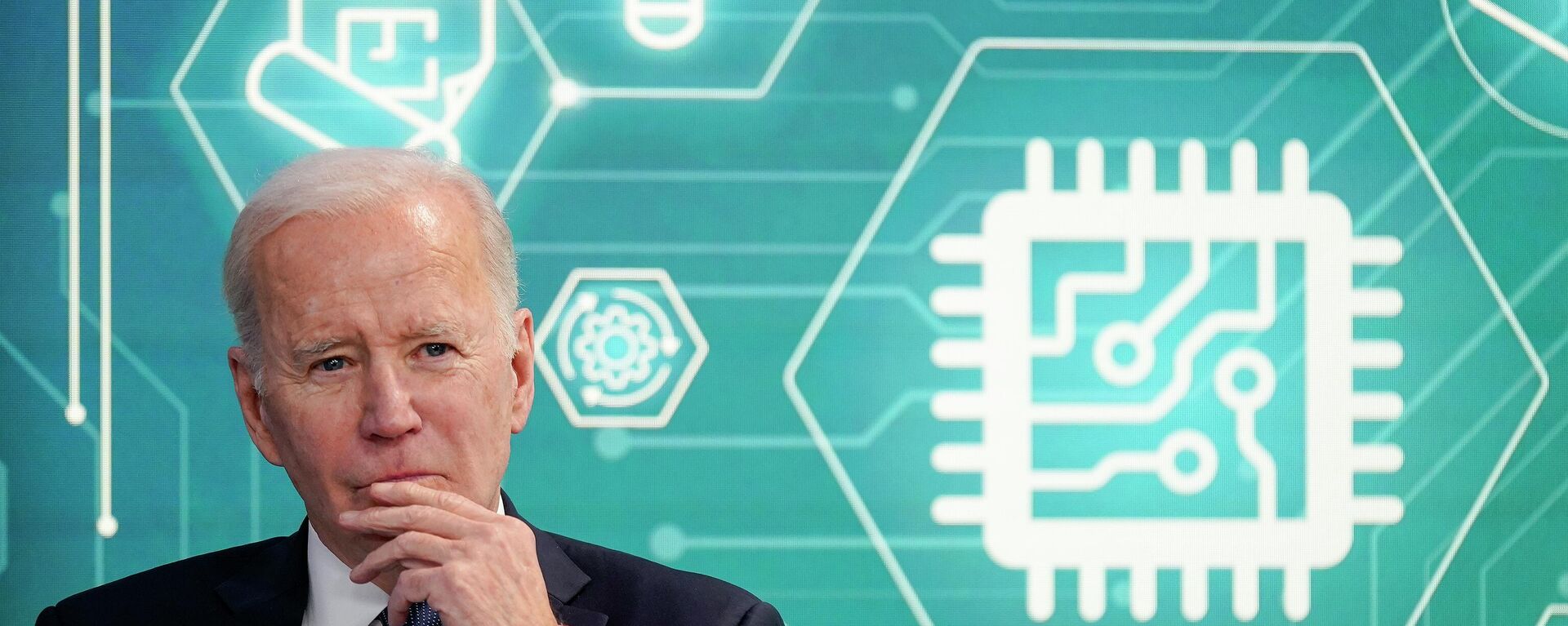https://sputnikglobe.com/20220907/indias-richest-businessman-decries-semi-conductor-nationalism-urges-us-to-transfer-tech-to-delhi-1100484076.html
India's Richest Businessman Decries 'Semi-Conductor Nationalism', Urges US to Transfer Tech to Delhi
India's Richest Businessman Decries 'Semi-Conductor Nationalism', Urges US to Transfer Tech to Delhi
Sputnik International
Indian Prime Minister Narendra Modi last December announced a $10 billion incentive to set up 20 semi-conductor manufacturing units in the country. He has said... 07.09.2022, Sputnik International
2022-09-07T11:15+0000
2022-09-07T11:15+0000
2022-09-07T11:15+0000
india
semi-conductors
adani group
us
china
chips
https://cdn1.img.sputnikglobe.com/img/07e5/03/1e/1082487215_0:0:1280:721_1920x0_80_0_0_2809adbc6478a5f1bdbedda0ea062fc7.jpg
Indian billionaire industrialist Gautam Adani, the chairman of the Adani Group, has said that New Delhi will have to shed its reliance on other countries in the manufacturing of semi-conductors, urging the US to transfer technology to New Delhi so that the South Asian country could be self-reliant in the crucial sector.The Indian businessman noted that despite being the “best global pool” for engineers for many American companies, the primary value addition to the semi-conductor business was taking place outside the country.Adani also underlined that semi-conductor, which have applications in automobile, defence, electronic and IT industries, are “essential to all sectors of the economy.”According Adani, the ongoing conflict in Ukraine "has only accelerated this recognition.”The remarks by the influential Indian businessman come amid increasing competition between the US and China in the semi-conductor industry and efforts by the Biden administration to restrict supplies of the crucial technology to Beijing.The Joe Biden administration imposed a new “license requirement” on the sale of high-end graphics processors and artificial intelligence accelerators to China and Russia to restrict the sale of advanced semi-conductor chips to these countries.President Biden last month also signed into law the CHIPS and Science Act of 2022, which sanctions over $250 billion in further bolstering semi-conductor manufacturing in the US.The recent moves by the US come amid a partial improvement in the global supply of semi-conductor chips after the supply chains were disrupted due to the COVID-related restrictions.India, like many other emerging economies, risks being caught in the crossfire of the ongoing rivalry for chips between the world’s biggest economies.Last August, Indian automobile giants Maruti Suzuki India (a subsidiary of the Japanese parent company) and Mahindra and Mahindra (M&M) reported a decline in sales owing to the shortage of electric components developed with the help of semi-conductors.Both the companies said last month that auto sales have risen again as the global semi-conductor shortage has somewhat eased as compared to last year.
https://sputnikglobe.com/20220901/us-orders-nvidia-amd-to-restrict-sales-of-advanced-ai-chips-to-china-1100255148.html
china
Sputnik International
feedback@sputniknews.com
+74956456601
MIA „Rossiya Segodnya“
2022
News
en_EN
Sputnik International
feedback@sputniknews.com
+74956456601
MIA „Rossiya Segodnya“
Sputnik International
feedback@sputniknews.com
+74956456601
MIA „Rossiya Segodnya“
india, semi-conductors, adani group, us, china, chips
india, semi-conductors, adani group, us, china, chips
India's Richest Businessman Decries 'Semi-Conductor Nationalism', Urges US to Transfer Tech to Delhi
Indian Prime Minister Narendra Modi last December announced a $10 billion incentive to set up 20 semi-conductor manufacturing units in the country. He has said the domestic consumption of semi-conductors will touch $80 billion in 2026 and further hit a $110 billion-mark in 2030.
Indian billionaire industrialist Gautam Adani, the chairman of the Adani Group, has said that New Delhi will have to shed its reliance on other countries in the manufacturing of semi-conductors, urging the US to transfer technology to New Delhi so that the South Asian country could be self-reliant in the crucial sector.
“India cannot remain dependent on global supply chains that are based on semiconductor nationalism and will need US support with technology transfer,” Adani said while delivering an acceptance speech after being conferred with the ‘Global Leadership Award’ by the US-India Business Council (USIBC) in New Delhi on Wednesday.
The Indian businessman noted that despite being the “best global pool” for engineers for many American companies, the primary value addition to the semi-conductor business was taking place outside the country.
“The semiconductor industry is a classic example with more engineers deployed in India than anywhere else in the world, and yet, India has no semiconductor plant,” he stated.
Adani also underlined that semi-conductor, which have applications in automobile, defence, electronic and IT industries, are “essential to all sectors of the economy.”
According Adani, the ongoing conflict in Ukraine "has only accelerated this recognition.”
The remarks by the influential Indian businessman come amid increasing competition between the US and China in the semi-conductor industry and efforts by the Biden administration to restrict supplies of the crucial technology to Beijing.

1 September 2022, 10:20 GMT
The Joe Biden administration imposed a new “license requirement” on the sale of high-end graphics processors and artificial intelligence accelerators to China and Russia to restrict the sale of advanced semi-conductor chips to these countries.
President Biden last month also signed into law the
CHIPS and Science Act of 2022, which sanctions over $250 billion in further bolstering semi-conductor manufacturing in the US.
The recent moves by the US come amid a partial improvement in the global supply of semi-conductor chips after the supply chains were disrupted due to the COVID-related restrictions.
India, like many other emerging economies, risks being caught in the crossfire of the ongoing rivalry for chips between the world’s biggest economies.
Last August, Indian automobile giants Maruti Suzuki India (a subsidiary of the Japanese parent company) and Mahindra and Mahindra (M&M) reported a decline in sales owing to the shortage of electric components developed with the help of semi-conductors.
Both the companies said last month that auto sales have risen again as the global semi-conductor shortage has somewhat eased as compared to last year.


